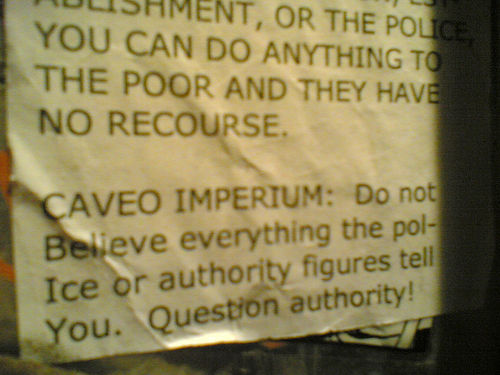
God’s authority is absolutely arbitrary.
This isn’t an original thought – George Herbert Mead had it almost a century ago. The basic idea is this: any other person’s authority – both in topic and in literal command-authority – comes from something that another person can understand. You may not be able to replicate, say, my job expertise, but you can get a sense of why I have the authority of my job.
God, on the other hand, simply says “I’m God, deal with it.” Mead’s point is more that the church(es) have said that, but the God of the Book explicitly says as much in the Book of Job. “Where were you when I created the world? Were you there when Leviathan spanned the globe?” That’s the sole justification for God’s authority.
Still, this can be taken two ways. The less kind (and more traditional) is the authoritarian, a version of “I brought you into this world and I’ll take you back out of it!” But that kind of sensibility doesn’t make sense in the book of Job – and definitely doesn’t make sense if you’re following a Christian tradition.
We have to consider that God – and let’s assume that God as uber-everything is a valid proposal for a moment – is instead saying “My perspective is so different than yours, so much larger, that you can’t understand it.” This fits with our idea of God as all-knowing. In fact, it meshes very nicely with the concept of God being in everything, a belief best practiced by the Sufis. The concept still exists in Christianity – if God is everywhere, then God is inherently in everything as well. And this is where God’s perspective comes into play.
Sociology and history both demonstrate that people are products of thier point and place in time. St. Paul was a sexist (though less than many of his contemporaries) – but that was because of where and when he lived. Many of the USAian founding fathers were slaveowners – not because of some deep philosophical belief, but because that’s simply how things were done then. We don’t presume this as a personal moral flaw, just a part of their society. Humans just *are* limited by thier experience.
God, by our definition above, is not.
We cut the Founding Fathers (for example) a break on slavery as products of thier time and place in history. That doesn’t mean we *agree* with their position – we’re not in colonial America in the 1700’s – but we don’t condemn them for not being 21st century people. God – by definition – has this perspective on *everyone*. We may not be good, or nice… but at least we’re understandable.
Something that has always bothered me is the presumption of the Divine as an all-loving and all-caring entity. I mean, why? People suck, you know? I find it deeply ironic that through sociology I could find a reasonable reason why the Divine may not be all-loving… but at least could be *all-understanding*.
